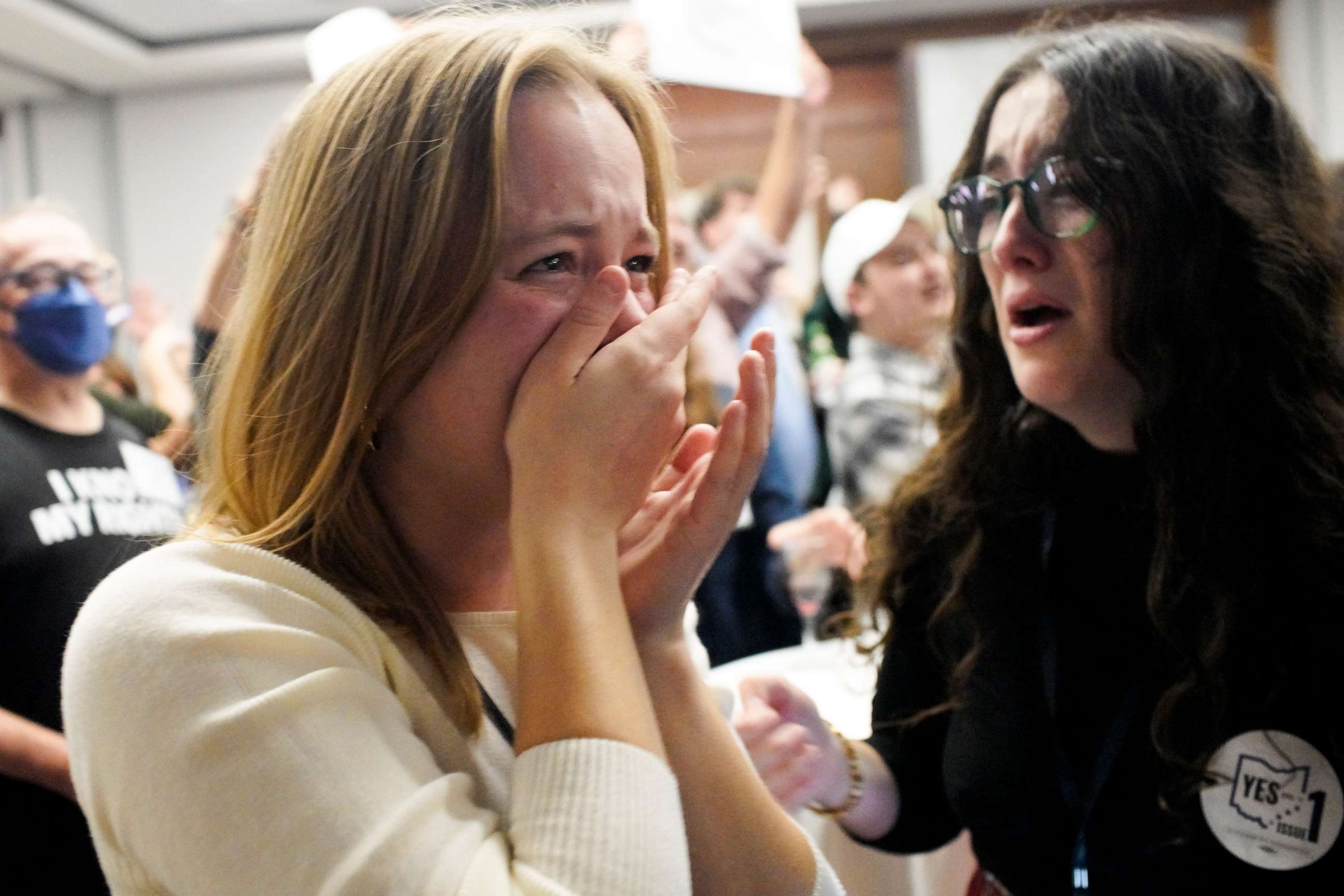Abortion issues burn GOP again, as Democrats take a big election night: ANALYSIS
For all the woes faced by Biden, his party is pulling out wins.
A year after an expected "red wave" turned into a ripple, conservatives' election messaging in 2023 sought to adjust to emerging realities.
In Ohio, strategists tried to sidestep a direct vote on abortion rights like the one that took place on Tuesday. In Virginia, the popular Republican governor sought to embrace a showdown over the issue -- while trying to redefine the terms of a polarizing debate. And in Kentucky, a rising-star Black Republican ran for governor defending his state's abortion ban while opening the door to new exceptions.
None of those choices appear to have worked for the GOP on Tuesday.
Election Day 2023 instead continued a losing streak for conservatives on abortion-related issues that began virtually the moment the Supreme Court tossed out Roe v. Wade last year -- extending through states that are blue, red and decidedly purple.
In Republican-leaning Ohio, voters comfortably approved an amendment to the state constitution establishing a right to an abortion, ABC News projected. That will effectively override a GOP-passed ban on abortion after six weeks of pregnancy that had been tied up in legal challenges.
In Democratic-leaning Virginia, with results still incomplete as of late Tuesday, Republican Gov. Glenn Youngkin's wide popularity with locals appears to have failed to gain his party unified control of the state Legislature as Democrats were -- at the least -- projected by the Associated Press to hold the state Senate, despite Youngkin's heavy involvement in the races.
That result would shelve the bill that Youngkin campaigned on -- a proposal he called a "reasonable" measure to largely ban abortions beyond 15 weeks -- and likely quiet presidential buzz around the Virginia governor.
In solidly Republican Kentucky, Democratic Gov. Andy Beshear was projected to win reelection on Tuesday while attacking his state's no-exemptions abortion ban as extreme. That law went into effect despite voters' rejection of a constitutional amendment that sought to do the same thing.

A word of caution: The scattered races that drew national attention this year did so for a variety of reasons. Many turned on intensely local dynamics that are hard to extrapolate beyond a state or legislative district's borders.
Still, taken together, they point toward a winning potential message for Democrats than can work despite President Joe Biden's low approval rating and despite the intense popularity of former President Donald Trump in GOP-heavy pockets of the country.
"It's a wake-up call for the Democratic Party to say, 'It's time we think about Ohio and putting it back in play,'" Cleveland Mayor Justin Bibb told ABC News on Tuesday. "When you see this extreme Republican movement, a majority of folks in our state won't want these kinds of policies on the books."
Ohio voters joined those in California, Michigan and Vermont in enshrining abortion rights in their state constitutions. Voters in Kansas, Montana and Kentucky have also rejected roughly opposite efforts that would have banned abortion in the wake of the Dobbs ruling.
Those votes are fueling efforts to place abortion on the ballot in other states including Arizona, Florida, Missouri and Nevada next year. (Ohio Democrats may wish that the constitutional amendment there instead came up for a vote next year, with the presidential race and incumbent Democratic Sen. Sherrod Brown on the ballot in 2024.)
The results in Ohio showed how thoroughly the statewide electorate can be remade depending on the issues at stake. Exit polls showed that voters on Tuesday night actually supported President Joe Biden over former President Donald Trump by a 45-43% margin in 2020 -- even though Biden lost the state 53-45. Self-described liberals made up 34% of the electorate, a margin unmatched in exit polls in the state going back nearly 40 years.
That result shouldn't be mistaken for a sudden surge in support for Biden. The same exit poll found 73% of Ohio voters on Tuesday do not want Biden to run again, compared to 63% who say the same about Trump.
But the coalition of voters who came out Tuesday gives some Democrats in the state hope that places like Ohio can be competitive again, in a race framed against conservative extremism.
In that state, Republicans had led a proposed change to the rules to make it harder to pass a state constitutional amendment, only to fall far short on that over the summer -- and then lose on the abortion issue itself on Tuesday. Voters were also simultaneously projected to endorse legalization of recreational marijuana, a move also opposed by conservatives.

Abortion wasn't directly on the ballot elsewhere this year -- in the Mississippi governor's race, for example, both candidates supported major restrictions and Democrat Brandon Presley ultimately conceded to incumbent Republican Tate Reeves -- but the results in Kentucky bucked presidential-year trends even more starkly than Ohio's results.
Trump won Kentucky by more than 25 points in 2020, yet Republican Daniel Cameron -- who was showcased at Trump's convention, and whom Trump endorsed as a "young star" -- lost to Beshear, who himself ousted a GOP incumbent to win his first term in 2019 by a narrower margin.
"It was a victory that sends a loud, clear message -- a message that candidates should run for something, and not against someone," Beshear said in his victory speech late Tuesday.
Also having a less-than-stellar night? Youngkin, whose national profile has been raised with his efforts to rally his state behind the abortion restrictions he sought to sell as a "reasonable" middle-ground stance. Along the way, he pointedly refused to entirely rule out a 2024 presidential run, while making clear that he was flattered by the attention and eager to see his governing concepts adopted beyond his home state.
"I think this is a chance for Virginia to prove to be a leader to bring people together around one of the most difficult topics in America. And I think we can lead here," Youngkin told ABC News on Tuesday night, before polls closed in Virginia.
One of the most notable GOP losses of the night was a Republican state senator who works as an ob-gyn. Sen. Siobhan Dunnavant was at the forefront of Youngkin-led efforts to message affirmatively on what she was calling potential "common ground" on abortion.
As the dust clears from Tuesday, the GOP's difficulties in messaging on abortion are only outlined more starkly. And for all the political woes faced by Biden and national Democrats, their party showed an ability to still pull out surprising wins when the issues frame up in their favor.




